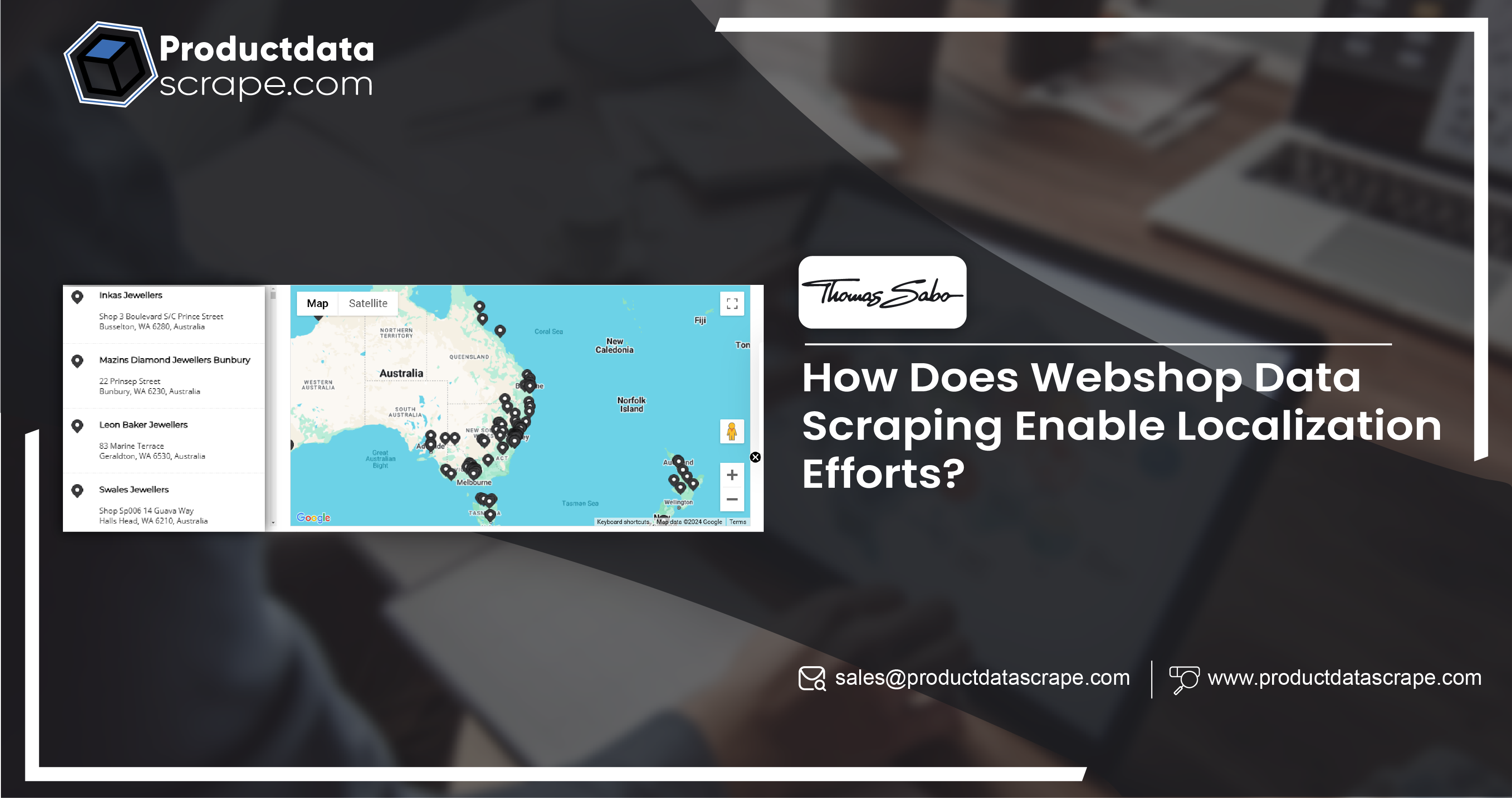
E-commerce product data extraction is crucial for businesses and researchers seeking structured information from online retail platforms. For a one-time data extraction from a webshop like the Swedish Thomas Sabo webshop the focus is on extracting localized data, including product details, descriptions, and pricing in Swedish. This product data scraping for e-commerce enables businesses to analyze competitor pricing, monitor trends, and enhance marketing strategies. Webshop data scraping involves collecting key fields such as article numbers, headers, descriptions, categories, prices, image links, and product URLs. Using tools like Python libraries (BeautifulSoup, Scrapy), data can be efficiently scraped and exported to an Excel file. While scraping, it's essential to consider website structures, potential anti-bot measures, and ethical guidelines. Ensuring compliance with terms of service and respecting website resources is vital for a smooth and responsible e-commerce product data extraction operation.
Why Scrape Data from Thomas Sabo?
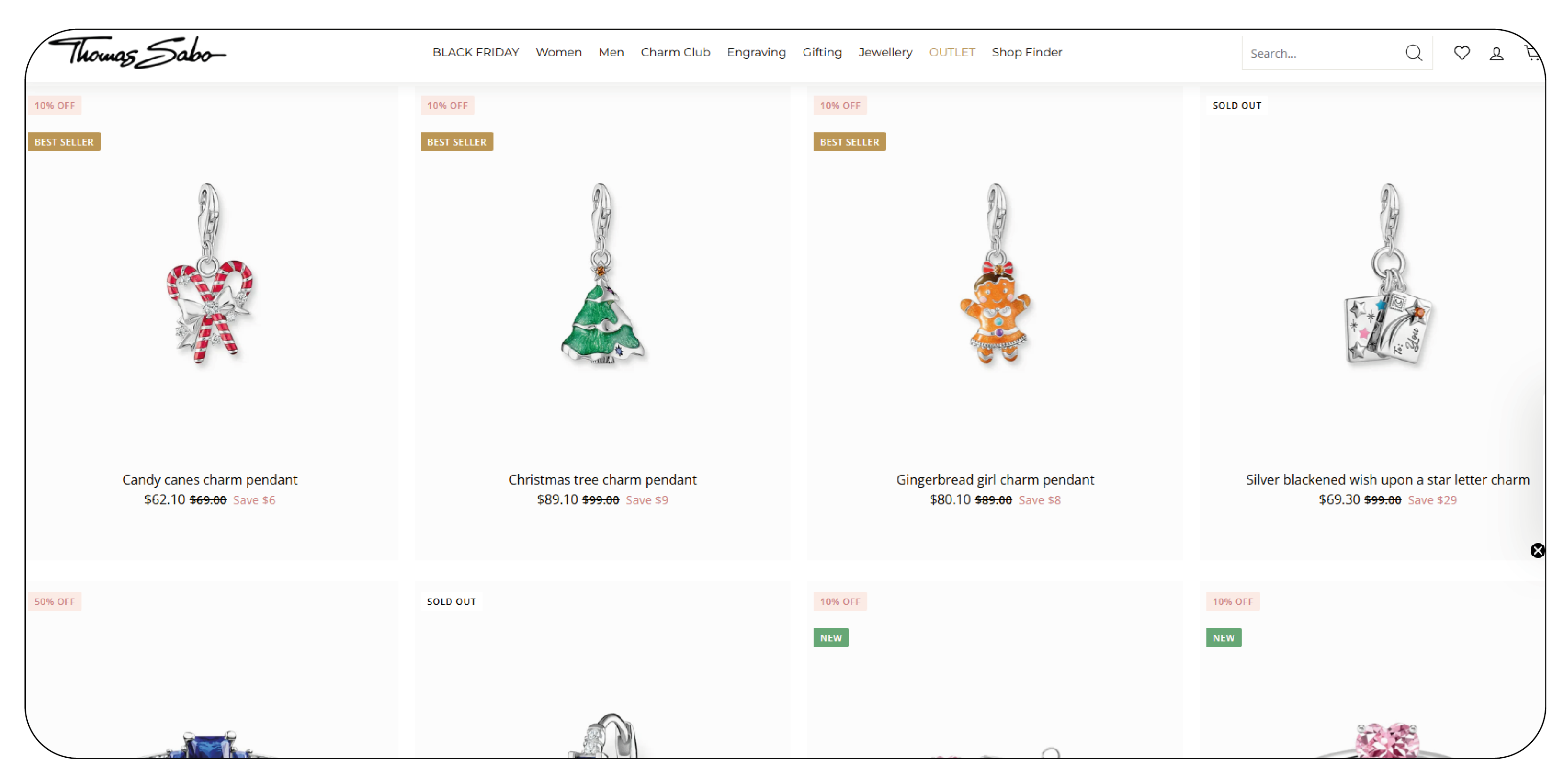
Thomas Sabo is a globally recognized brand specializing in high-quality jewelry, including rings, necklaces, watches, and bracelets. For the Swedish market, their webshop offers localized content in Swedish and pricing in SEK. Extracting this data allows businesses and individuals to:
Monitor Pricing Trends: Extract article numbers and prices from the webshop to track competitive pricing strategies within the Swedish market. This allows companies to compare their prices against local competitors and identify market shifts, ensuring they remain competitive. Real-time monitoring of product prices can help adjust promotions, discounts, and price positioning strategies, providing a crucial advantage in the e-commerce landscape.
Analyze Product Offerings: Scraping product descriptions and headers allows businesses to assess the variety and classification of products available to Swedish consumers. With a well-organized dataset, companies can analyze which product types perform best, which categories have the highest demand, and how the offerings are categorized. This insight can be used to optimize inventory management and develop tailored marketing campaigns that resonate with local customers.
Enhance Market Research: Web scraping product images and links from the webshop provides a comprehensive understanding of how Swedish customers present and perceive products. Businesses can gauge customer preferences by extracting detailed data, including product features, images, and descriptions. This information can be used to shape new product development, identify gaps in the market, or adjust product listings to better align with consumer expectations.
Enable Localization Efforts: When webshop data scraping services focus on extracting product information in Swedish, including localized pricing, descriptions, and images, businesses can enhance their localization strategies. This allows companies to integrate products into multilingual databases, optimize websites for specific regions, and offer tailored content that resonates with local audiences. E-commerce scraping for product listings makes it easier to adapt and refine offerings based on regional demand, ensuring customers a more personalized shopping experience.
Target Data Fields to Extract From Webshop

The extraction process is tailored to capture the following critical fields from Thomas Sabo's Swedish webshop:
- 1. Artikelnummer (Article Number)
A unique product identifier is critical for cataloging and referencing individual items.
- 2. Header
The product name or title provides a quick overview of the item's identity.
- 3. Description
A detailed summary of the product's features, materials, and intended usage in Swedish.
- 4. Category
The classification or grouping of the product, such as "Rings," "Watches," or "Bracelets."
- 5. Price
The product's price is displayed in SEK, including VAT, as shown on the webshop.
- 6. Image link
The URL of the product's primary image ensures a visual representation of the item.
- 7. Product link
The direct link to the product's webpage for detailed exploration and further reference.
Deliverable Format
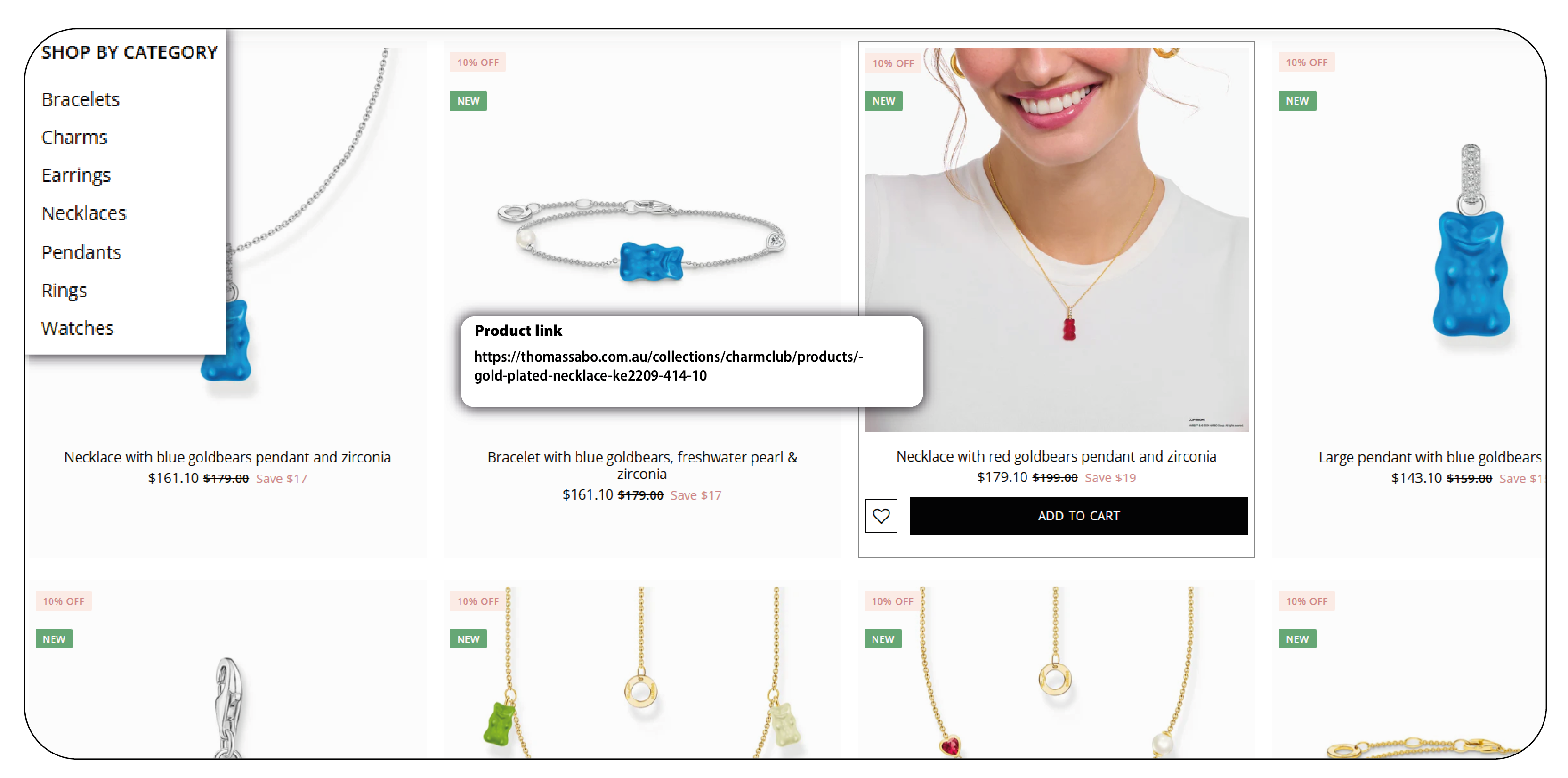
The scraped data should be presented in a structured Excel file, organized into the following columns:
Artikelnummer
Header
Description
Category
Price
Image link
Product link
Localization is peramount, so all text must remain in Swedish, and the prices should reflect the values listed on the Swedish Thomas Sabo webshop.
Detailed Scraping Process
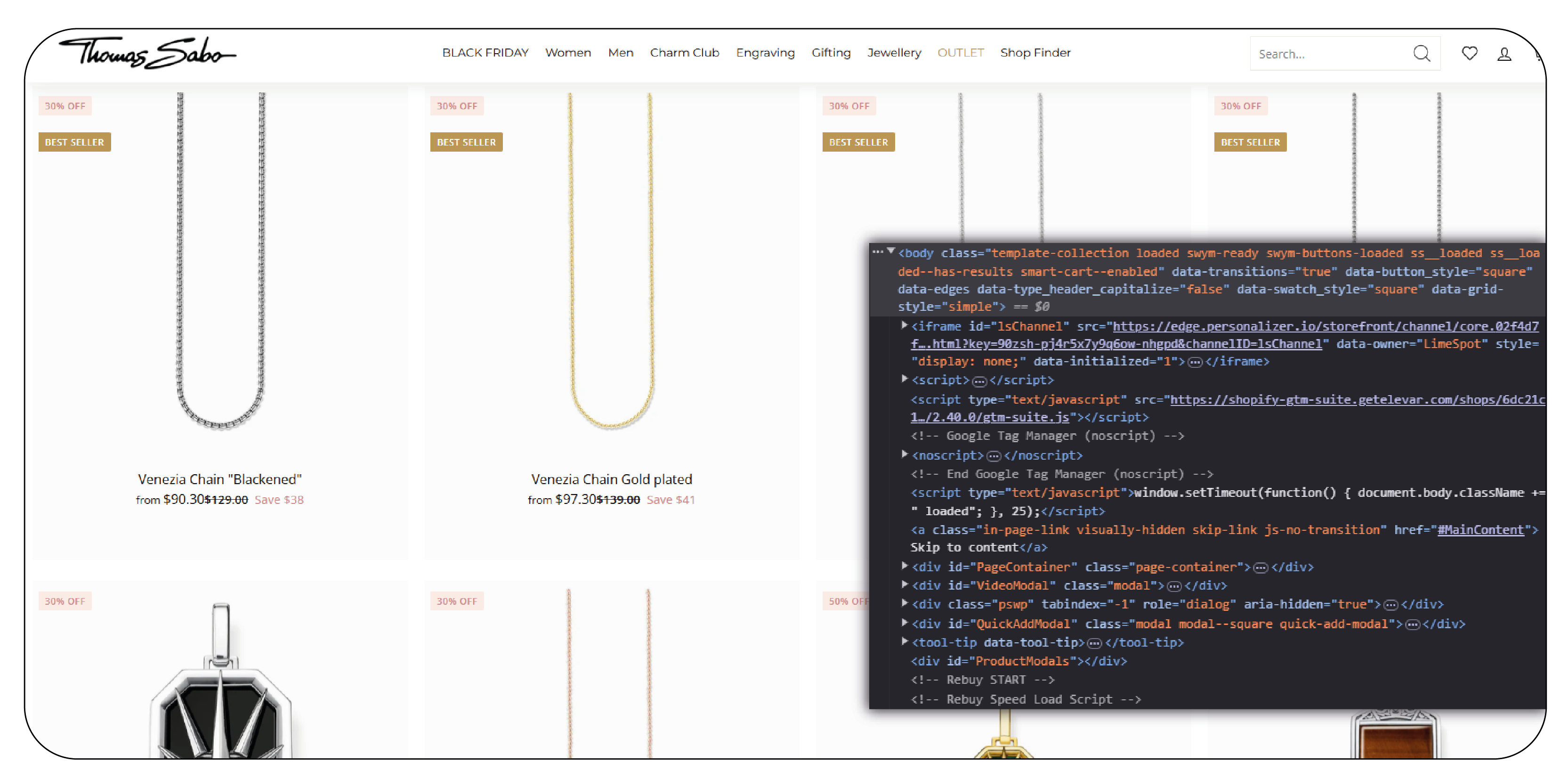
1. Preperation and Planning
Before initiating the scraping process, thorough preperation is essential. This involves:
Mapping the structure of the webshop to identify product pages and data elements.
Noting website navigation, pagination, and JavaScript-based content loading.
Preparing tools and scripts for efficient and accurate data extraction.
2. Choosing the Right Tools
Technical Approaches
For experienced developers, the following Python libraries are excellent for scraping:
BeautifulSoup: Ideal for parsing static HTML pages.
Scrapy: A robust framework for large-scale scraping.
Selenium: Handles dynamic content rendered via JavaScript.
The choice of tool depends on technical expertise, the complexity of the webshop, and the volume of data to be extracted.
3. Steps for Extracting Target Data
Step 1: Extracting Artikelnummer
Artikelnummer (article number) is displayed prominently on each product page, usually as an SKU (Stock Keeping Unit). This serves as the primary identifier for each product.
Step 2: Extracting the Header
The header is typically the product name at the top of the product page. This provides the primary label for the item and is crucial for identification.
Step 3: Extracting the Description
Descriptions provide detailed information, often including materials, dimensions, and care instructions. Ensure the localized Swedish text is extracted with all the details.
Step 4: Capturing the Category
Categories are typically found in the breadcrumbs or sidebar menu. This field organizes products into logical groupings, such as "Rings," "Bracelets," or "Earrings."
Step 5: Retrieving the Price
The price is displayed in SEK (Swedish Krona). Ensure that the extracted price matches the format and includes VAT if shown on the website.
Step 6: Saving the Imagelink
Each product has a primary image displayed. The URL of this image should be extracted and verified to ensure it links directly to the resource.
Step 7: Fetching the Product link
Each product page has a unique URL. Extracting these links allows quick access to product pages for further verification or analysis.
Exporting the Data to Excel
Once the data is extracted, structure it into an Excel file. Tools like Python's Pandas library simplify this process, allowing seamless formatting. Each column corresponds to a data field, ensuring clarity and usability.
Challenges in Scraping Thomas Sabo's Webshop
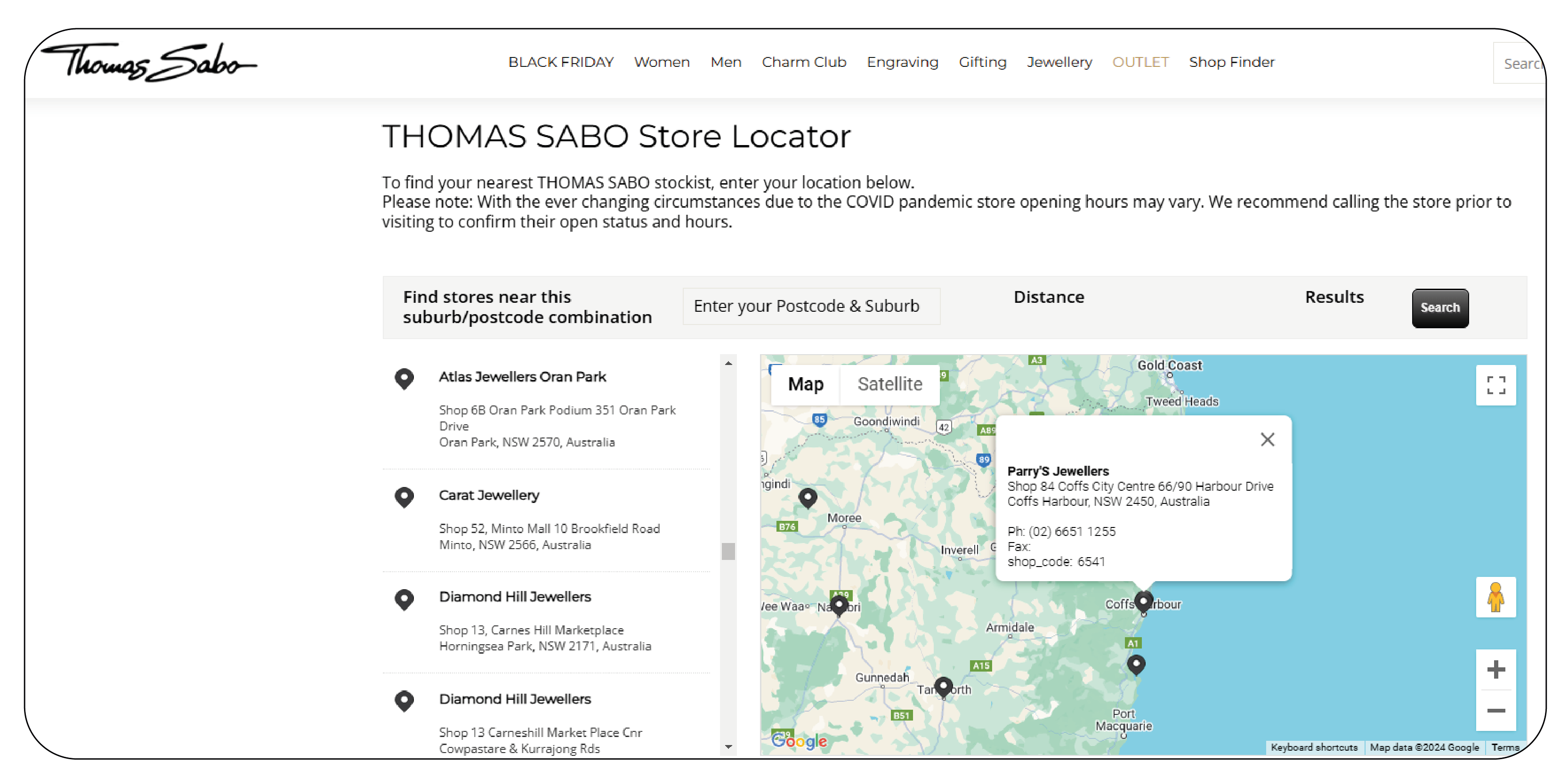 Dynamic Content: Many e-commerce websites, including the Swedish Thomas Sabo webshop, use JavaScript to dynamically load product details, images, and prices as you scroll or interact with the page. This dynamic nature makes it difficult for traditional scraping tools like BeautifulSoup to extract the necessary information. To handle this, web scraping e-commerce websites effectively requires using more advanced tools such as Selenium or Puppeteer, which simulate user interactions by rendering JavaScript. These tools can mimic scrolling, clicking, and other actions, ensuring all content is loaded and accessible for extraction. This method is precious when scraping complex websites with heavy dynamic content.
Pagination: Product listings are frequently spread across multiple pages on e-commerce sites, making it crucial to design scraping scripts that can handle pagination effectively. To ensure that the entire product catalog is scraped, the script should be able to navigate through the pages, extract data from each, and compile it into a comprehensive dataset. This feature is essential when performing Price Monitoring or analyzing product availability across many items. Please account for pagination to ensure complete data extraction, which may lead to accurate insights for Pricing Strategies.
Localization: The /SE/sv_SE domain of the webshop ensures that the content is tailored to the Swedish market, offering products in Swedish and listing prices in local currency. The scraping script must be domain-specific and focused on this region when performing eCommerce Dataset Scraping. Scripts must be carefully constructed to avoid inadvertently scraping data from other regional website versions, such as the German or UK domains. Ensuring proper localization, the scraped data will reflect accurate product information, descriptions, and pricing for Swedish customers, aiding businesses to target the correct demographic and tailor their marketing strategies.
Anti-Bot Measures: Websites often deploy anti-bot technologies to prevent automated scraping, such as CAPTCHA tests, rate-limiting, and IP blocking. To mitigate these challenges and ensure smooth data extraction, techniques like rotating IP addresses, introducing delays between requests, or using residential proxies can be applied. These strategies help bypass anti-bot measures while maintaining the integrity and efficiency of the scraping process. Implementing these methods is essential for consistent and uninterrupted Price Monitoring and other tasks related to eCommerce Dataset Scraping, allowing businesses to collect up-to-date product and pricing information without encountering obstacles.
Dynamic Content: Many e-commerce websites, including the Swedish Thomas Sabo webshop, use JavaScript to dynamically load product details, images, and prices as you scroll or interact with the page. This dynamic nature makes it difficult for traditional scraping tools like BeautifulSoup to extract the necessary information. To handle this, web scraping e-commerce websites effectively requires using more advanced tools such as Selenium or Puppeteer, which simulate user interactions by rendering JavaScript. These tools can mimic scrolling, clicking, and other actions, ensuring all content is loaded and accessible for extraction. This method is precious when scraping complex websites with heavy dynamic content.
Pagination: Product listings are frequently spread across multiple pages on e-commerce sites, making it crucial to design scraping scripts that can handle pagination effectively. To ensure that the entire product catalog is scraped, the script should be able to navigate through the pages, extract data from each, and compile it into a comprehensive dataset. This feature is essential when performing Price Monitoring or analyzing product availability across many items. Please account for pagination to ensure complete data extraction, which may lead to accurate insights for Pricing Strategies.
Localization: The /SE/sv_SE domain of the webshop ensures that the content is tailored to the Swedish market, offering products in Swedish and listing prices in local currency. The scraping script must be domain-specific and focused on this region when performing eCommerce Dataset Scraping. Scripts must be carefully constructed to avoid inadvertently scraping data from other regional website versions, such as the German or UK domains. Ensuring proper localization, the scraped data will reflect accurate product information, descriptions, and pricing for Swedish customers, aiding businesses to target the correct demographic and tailor their marketing strategies.
Anti-Bot Measures: Websites often deploy anti-bot technologies to prevent automated scraping, such as CAPTCHA tests, rate-limiting, and IP blocking. To mitigate these challenges and ensure smooth data extraction, techniques like rotating IP addresses, introducing delays between requests, or using residential proxies can be applied. These strategies help bypass anti-bot measures while maintaining the integrity and efficiency of the scraping process. Implementing these methods is essential for consistent and uninterrupted Price Monitoring and other tasks related to eCommerce Dataset Scraping, allowing businesses to collect up-to-date product and pricing information without encountering obstacles.
Ethical and Legal Considerations
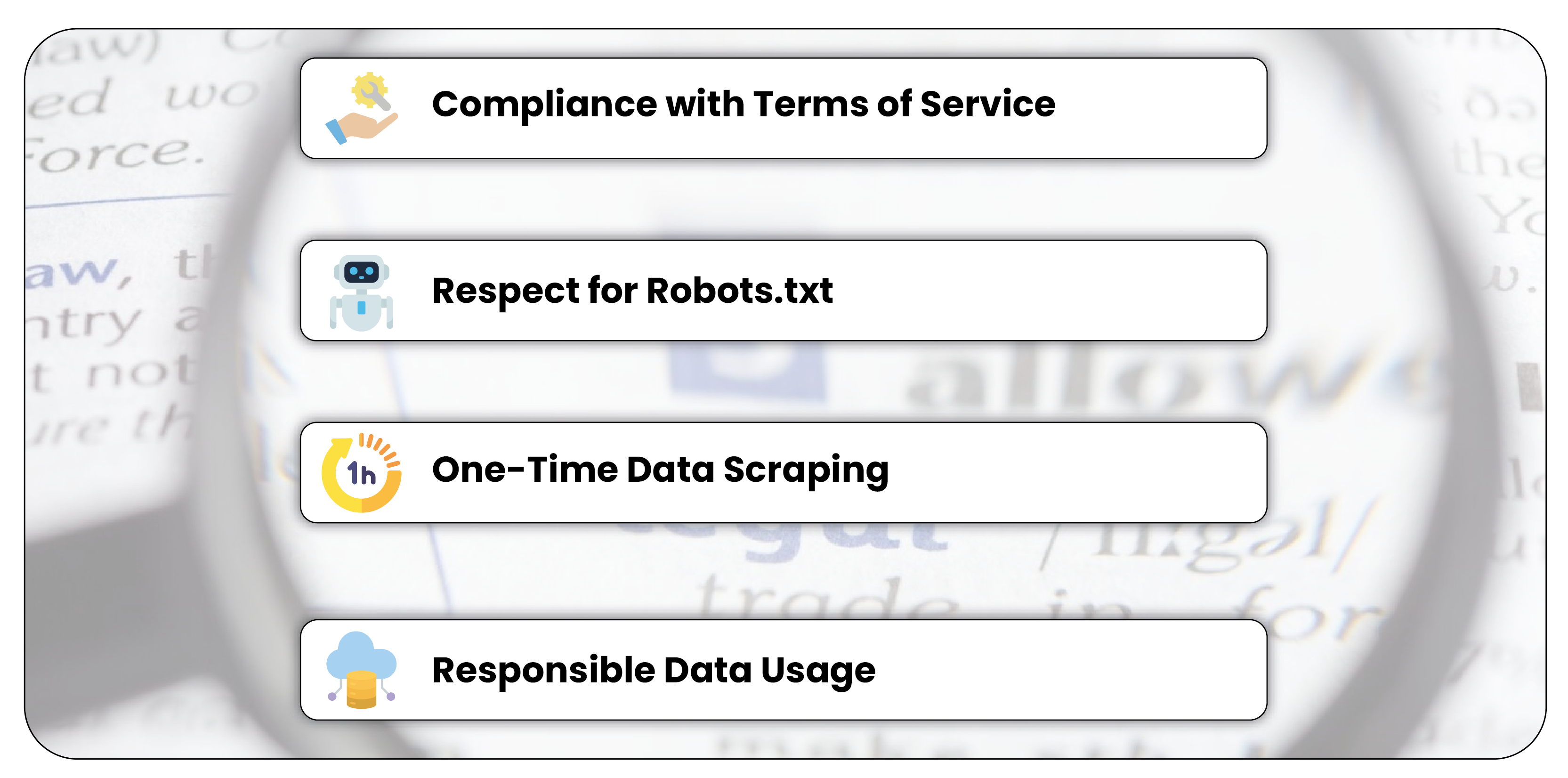
- Compliance with Terms of Service
Review Thomas Sabo's terms and conditions to ensure compliance with their policies on automated data collection.
- Respect for Robots.txt
Check the site's robots.txt file for guidelines on permissible scraping activities.
- One-Time Data Scraping
Limit the scraping operation to a single instance to minimize server load and respect website resources.
- Responsible Data Usage
Use the extracted data for ethical purposes, such as research, market analysis, or personal use.
Sample Workflow: Python Script
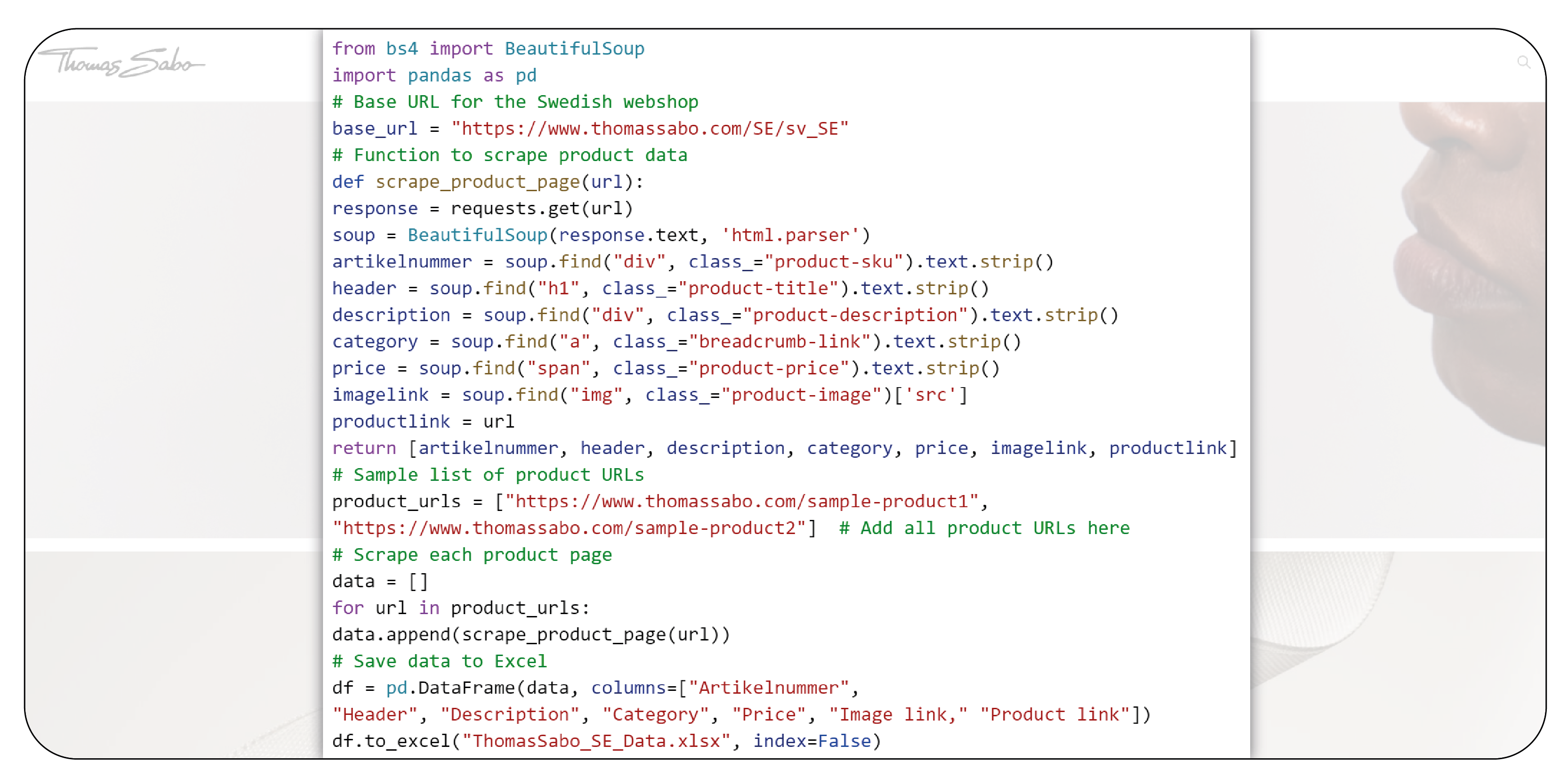
Here's a detailed Python script for extracting data from Thomas Sabo's Swedish webshop:
Conclusion
Webshop data scraping from the Swedish Thomas Sabo site is a powerful way to extract localized and structured product information. By focusing on Artikelnummer, Header, Description, Category, Price, Image link, and Productlink, businesses can leverage this data for competitive analysis, research, or cataloging. In particular, article numbers and categories data collection allow businesses to understand how products are classified, which can inform inventory management and marketing strategies. Adopting best practices, using the right tools, and ensuring compliance with ethical guidelines ensure a smooth and effective scraping operation. This approach streamlines gathering accurate product details and gives businesses valuable insights into market trends and customer preferences.
At Product Data Scrape, we strongly emphasize ethical practices across all our services, including Competitor Price Monitoring and Mobile App Data Scraping. Our commitment to transparency and integrity is at the heart of everything we do. With a global presence and a focus on personalized solutions, we aim to exceed client expectations and drive success in data analytics. Our dedication to ethical principles ensures that our operations are both responsible and effective.









































.webp)





.webp)
.webp)